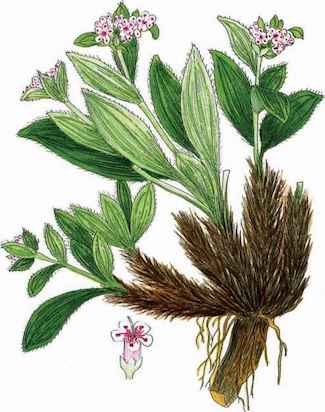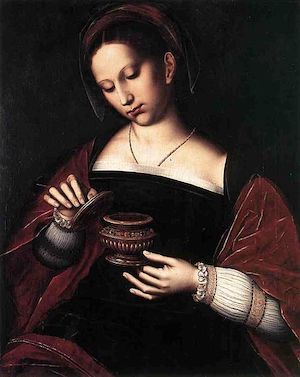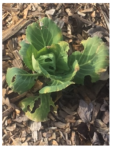While the king is reclining,1 my spikenard spreads forth its fragrance. – Song 1:12
It’s a humbling awareness, for a humble soul, that one smells good, and someone is drawn to you. Sometimes one even forgets they are wearing perfume! Have you ever had that happen? You put on a fragrance in the morning, and get so used to the smell that you completely forget about it during the day? That is, until someone later on comments that you smell good!
Jesus is our mirror, and His smile will reflect back to us and tell us that our faith and works of love are pleasing to Him. When in the divine presence of God, we may on one hand be aware of our stench. But that is not what she says. This is important. I feel a sense of despair whenever I hear God’s children talk about how wretched they are. This is not the result of love’s transformation! Love makes us clean, and gives us the perfume of spikenard to wear. Not to cover our stench, but to delight our Beloved, Jesus, and draw all people to Him!
Are we ashamed of this, our smell? Paul makes it sound like it’s a great honor:
But thanks be to God, who in Christ always leads us in triumphal procession, and through us spreads the fragrance of the knowledge of him everywhere. – 2 Corinthians 2:14
Behind “triumphal procession,” the image is a victorious general parading into his home city with pomp and rejoicing. So bold! It is Christ who leads us in this procession. He leads us as a partner to what He is doing in the earth — carrying the scent of His knowledge to others.
Spikenard in the Old.

Nardostachys jatamansi, source of Spikenard
Spikenard (also called Nard) is a fragrant and costly oil that comes from a herb, (in the Valerian family) harvested in the Himalayan mountains of Nepal, China, and India. The flowering plant gets about 3 feet tall, and its distinctive root has many hairy rootlets (“spikes”) coming off of it. The amber-colored oil is extracted from crushing and distilling the root and plant. Alabaster (a more soft, carvable rock) was a common container to hold and preserve its fragrance. It’s been used since very ancient times for perfume (especially for women to wear) and also some medicinal reasons.
There are only two “places” in the Bible where spikenard is found. (Hebrew nard; H5373) First, in The Song, where it is mentioned thrice. In 1:12 above, and here:
A garden enclosed is my sister, my spouse; a spring shut up, a fountain sealed. Your plants are an orchard of pomegranates, with pleasant fruits; camphire, with spikenard; spikenard and saffron; calamus and cinnamon, with all trees of frankincense; myrrh and aloes, with all the chief spices: -Song 4:12-13
The King is speaking here about the woman’s fragrant qualities. (For an unknown reason to me, spikenard is repeated twice in a row — like a hinge.)
Next, we have her beautiful response:
Awake, O north wind; and come, O south; Blow upon my garden, that the spices may flow out! Let my Beloved come into his garden, and eat his pleasant fruits. – Song 4:16
Selah. The wind is the Spirit of God, which we depend on for our Life. The Bride prays that the Spirit would inspire her “spices,” (the chiefest of which is Spikenard) and render them pleasing – so Christ might have His delight and joy in her. ❤︎
Spikenard in the New.

By Ambrosius Benson, used with permission
Now to the second, and only other place where Spikenard is mentioned. Remember? It is the story of the woman coming into a room where Jesus was reclining to eat, and pouring an alabaster box of nard all over his feet and head!
While Jesus was in Bethany, reclining at the table in the home of Simon the Leper, a woman came with an alabaster jar of very expensive perfume, made of pure nard. She broke the jar and poured the perfume on his head… -Mark 14:3. Also see John 12:3.
An exemplary story like this hardly needs explaining. Jesus said this woman, (commonly thought to be Mary) through prophetic intuition, anointed him for burial, and that her loving deed — like a flowing, spreading fragrance — would simply be told around the world!2
Summarizing.
Some deeds are done from love. Some deeds are just done. Love makes the difference whether they smell good or not.
If Spikenard is another metaphor for the “righteousness of the saints,” (Revelation 19:8) then we have a unified example in Mary, and the Shulamite woman, of what a Lover does not do with theirs.
- They do not cling to their goodness and call it their own, as if they did not receive it as a gift.
- They do not brag about their accomplishments so that others think more highly about them than they ought to think.
Rather, they pour it all out in the room, or place, or situation, where the presence of Jesus is manifest.
It may be done publicly — but if truly in love — what you do is not for the public’s praise.
Some will even find fault in what you do, thinking it such a waste.
But the ”nose” of Christ knows … the power that your Spikenard holds. ❤︎
inLove,
PamelaO
P.S. Click Here for a song called Spikenard, by Shannon Williamson, and also here for her beautiful “Spikenard Prayer.”!
1 Some translations have table, others couch, and yet others point out that it’s an infinitive verb, not a noun, so more accurately is the idea of reclining. This practice was common in those days, especially with wealthy homes, to have round reclining couches for both eating and lounging. In the Hebrew, the word is also attached to the idea of the King “encircling” or resting around her via his presence.
2 Mark 14:8 & 9



1 comment
Beautiful